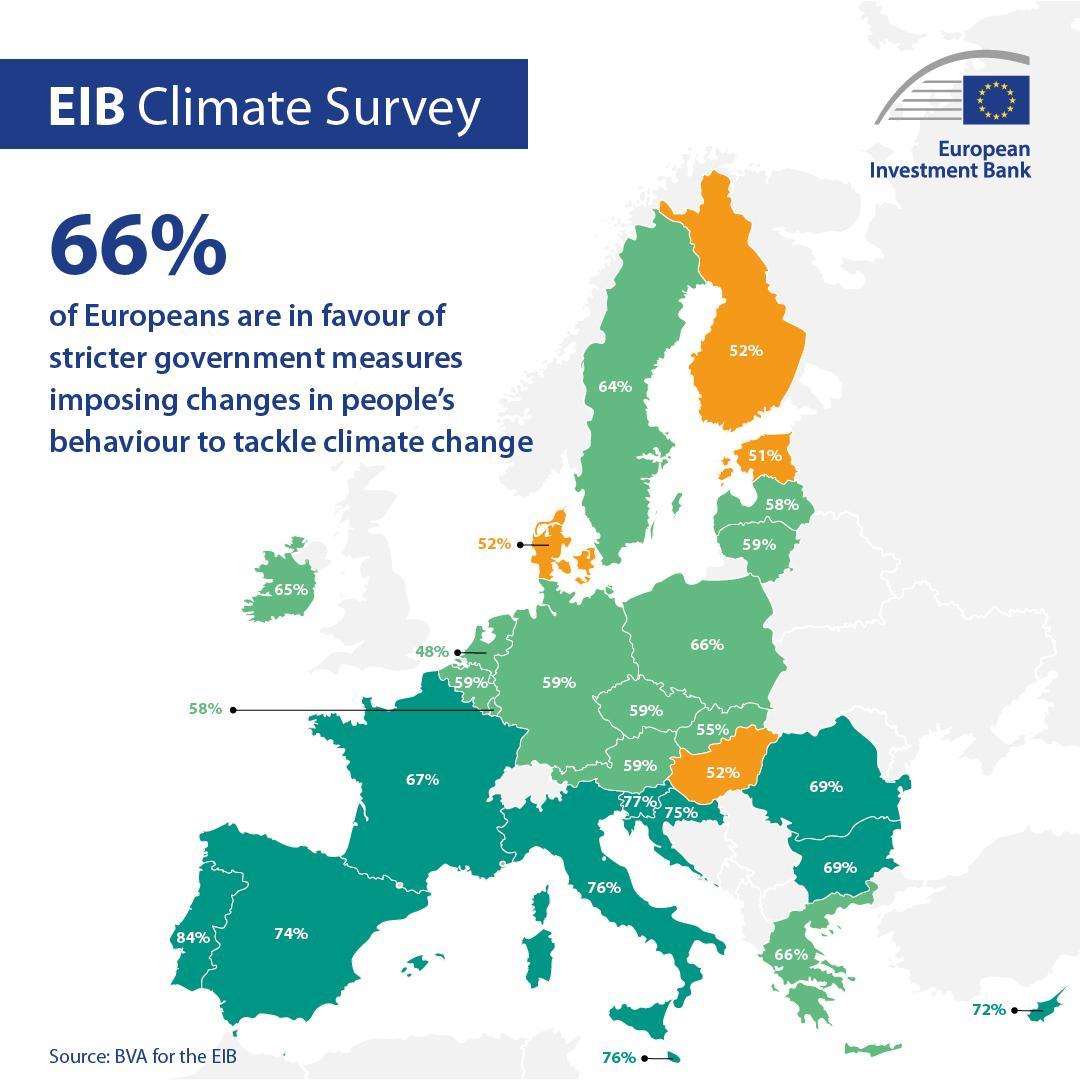March 30, 2023
The second part of the 2022-2023 European Investment Bank (EIB) Climate Survey explores people’s views on climate change in a rapidly changing world. The results from this release focus on people’s individual behaviour and the actions they are taking to combat climate change.
Main findings
- 76% of Europeans aged 20-29 say the climate impact of prospective employers is an important factor when job hunting, and 22% say it is even a top priority.
- 66% of all European respondents are in favour of stricter government measures to impose a change in personal behaviour (72% of people under 30).
- 79% of European respondents are in favour of labelling all food to help limit the impact on climate and the environment.
- 62% of Europeans say they would pay more for climate-friendly food.
- 56% would be in favour of a carbon budget system to set a cap on the most climate-damaging consumption (62% of people under 30).
Individual behaviour and stricter government measures
The war in Ukraine and its consequences, including rising energy prices and inflation, have dramatically increased concerns about declining purchasing power in Europe. However, climate change remains the second biggest challenge facing Europeans, according to respondents. Nearly three-quarters of respondents (72%) say they are convinced that their own behaviour can make a difference in addressing the climate emergency.
For many, the government has a role to play in encouraging individual behavioural change. Two-thirds of Europeans (66%) are in favour of stricter government measures imposing a change in people’s behaviour to tackle climate change (72% of respondents under 30 would welcome such measures).
Jobseeker priorities
A growing number of people entering the workforce each year are looking at employers’ climate credentials when job hunting. Nearly two-thirds of Europeans (62%) say it is important that prospective employers prioritise sustainability. For 16% of Europeans, it is even a top priority. Of people aged 20 to 29 — typically those looking for their first job — over three-quarters (76%) say that sustainability is an important factor in their choice of employer, with 22% saying it is a top priority.
Capping individual consumption
A majority of European respondents (56%) say they would be in favour of a carbon budget system that would allocate each individual a fixed number of yearly credits to be spent on items with a big carbon footprint (non-essential goods, flights, meat, etc.). In comparison, Chinese respondents strongly favour such a measure (83%), but Americans are less supportive, with less than half in favour (49%).
It is noteworthy that a majority of Europeans favour this measure regardless of income (59% of lower-income respondents, 58% of middle-income respondents, and over 56% of higher-income respondents).
Food labelling and pricing
Food production accounts for a significant share of greenhouse gas emissions. To help people make more sustainable choices when grocery shopping, 79% of Europeans are in favour of labelling all food products with their climate footprint (17 percentage points more than Americans, with 62%, but 9 percentage points less than Chinese people, with 88%).
In addition, 62% of Europeans say they would be willing to pay slightly more for food that is produced locally and more sustainably (close to Americans, with 60%, but 21 percentage points below Chinese people, with 83%). This willingness to pay more for food spans all income groups (60% of lower-income respondents, 61% of middle-income respondents and 65% of higher-income respondents).
Reducing the consumption of meat and dairy products would be another efficient way to limit greenhouse gas emissions. Just over half of Europeans (51%) would be in favour of limiting the amount of meat and dairy products that people can buy to fight climate change (11 percentage points above Americans, with 40%, but well below Chinese people, with 73%).
Source: European Investment Bank
Legal Notice: The information in this article is intended for information purposes only. It is not intended for professional information purposes specific to a person or an institution. Every institution has different requirements because of its own circumstances even though they bear a resemblance to each other. Consequently, it is your interest to consult on an expert before taking a decision based on information stated in this article and putting into practice. Neither Karen Audit nor related person or institutions are not responsible for any damages or losses that might occur in consequence of the use of the information in this article by private or formal, real or legal person and institutions.







